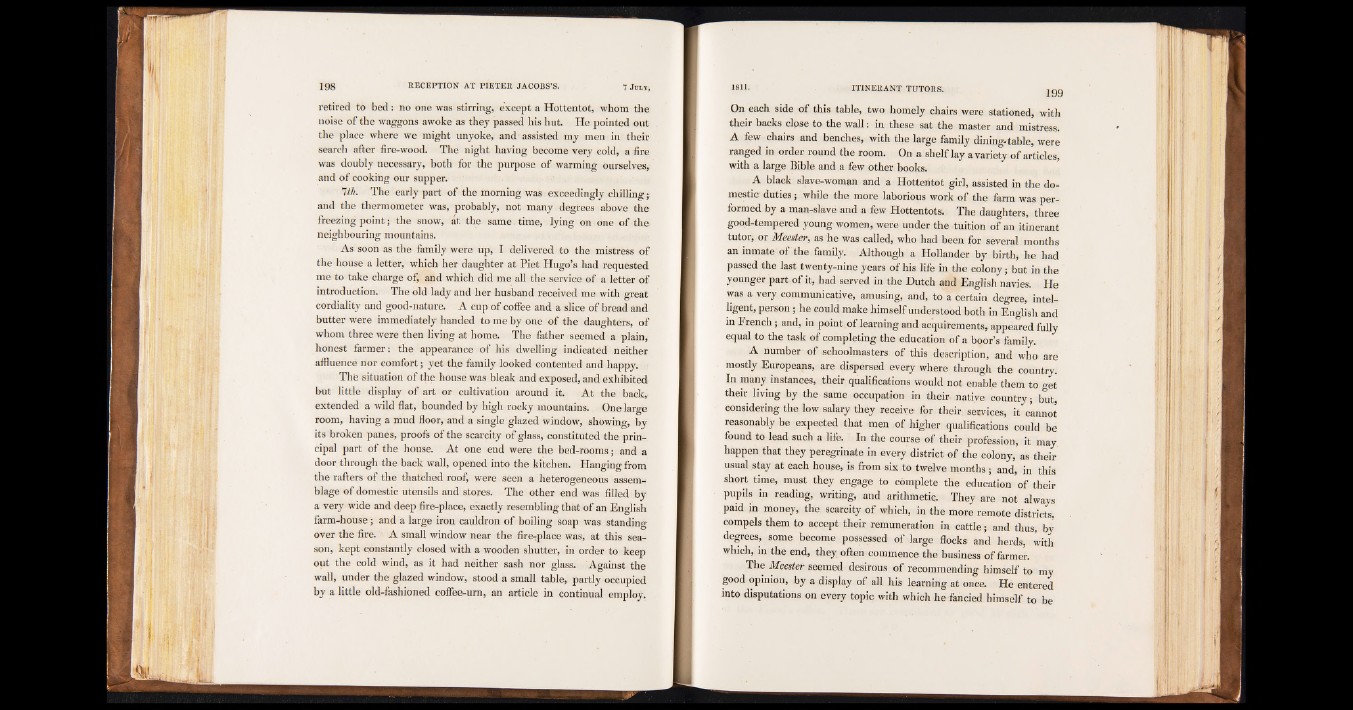
retired to bed : no one was stirring, except a Hottentot, whom the
noise of the waggons awoke as they passed his hut. He pointed out
the place where we might unyoke, and assisted my men in their
search after fire-wood. The night having become very cold, a fire
was doubly necessary, both for the purpose of warming ourselves,
and of cooking our supper.
7th. The early part of the morning was exceedingly chilling ;
and the thermometer was, probably, not many degrees above the
freezing point ; the snow, at the same , time, lying on one of the
neighbouring mountains.
As soon as the family were up, I delivered to the mistress of
the house a letter, which her daughter at Piet Hugo’s had requested
me to take charge of, and which did me all the service of a lettèr of
introduction. The old lady and her husband received me with great
cordiality and good-nature. A cup of coffee and a slice of bread and
butter were immediately handed to me by one of the daughters, of
whom three were then living at home. The father seemed a plain,
honest farmer: the appearance of his dwelling indicated neither
affluence nor comfort ; yet th.e family looked contented and happy.
The situation of the house was bleak and exposed, and exhibited
but little display of art or cultivation around it. At the back,
extended a wild flat, bounded by high rocky mountains. One large
room, having a mud floor, and a single glazed window, showing, by
its broken panes, proofs of the scarcity of glass, constituted the principal
part of the house. At one end were the bed-rooms ; and a
door through the back wall, opened into the kitchen. Hanging from
the rafters of the thatched roof, were seen a heterogeneous assemblage
of domestic utensils and stores. The other end was filled by
a very wide and deep fire-place, exactly resembling that of an English
farm-house ; and a large iron cauldron of boiling soap was standing
over the fire. A small window near the fire-place was, at this season,
kept constantly closed with a wooden shutter, in order to keep
out the cold wind, as it had neither sash nor glass. Against the
wall, under the glazed window, stood a small table, partly occupied
by a little old-fashioned coffee-urn, an article in continual employ.
On each side of this table, two homely chairs were stationed, with
their backs clpse to the wall: in these sat the master and mistress.
A few chairs and benches, with the large family dining-table, were
ranged in order round the room. On a shelf lay a variety of articles,
with a large Bible and a few other books.
A black slave-woman and a Hottentot girl, assisted in the domestic
duties; while the more laborious work of the farm was performed
by a man-slave and a few Hottentots. The daughters, three
good-tempered young women, were under the tuition of an itinerant
tutor, or Meester, as he was called, who had been for several months
an inmate of the family. Although a Hollander by birth, he had
passed the last twenty-nine years of his life in the colony; but in the
younger part of it, had served in the Dutch and English navies. He
was a very communicative, amusing, and, to a certain degree, intelligent,
person; he could make himself understood both in English and
in French ; and, in point of learning and acquirements, appeared fully
equal to the task of completing the education of a boor’s family.
A number of schoolmasters of this description, and who are
mostly Europeans, are dispersed every where through the country.
In many instances, their qualifications would not enable them to get
their living by the same occupation in their- native country; but,
considering the low salary they receive for their services, it cannot
reasonably be expected that men of higher qualifications could be
found to lead such a life. In the course of their profession, it may
happen that they peregrinate in every district of the colony, as their
usual stay at each house, is from six to twelve months; and, in this
short time, must they engage to complete the education of their
pupils in reading, writing, and arithmetic. They are not always
paid in money, the scarcity of which, in the more remote districts,
compels them to accept their remuneration in cattle; and thus, by-
degrees, some become possessed of large flocks and herds, with
which, in the end, they, often commence the business of farmer.
The Meester seemed desirous of recommending himself to my
good opinion, by a display of all his learning at once. He entered
into disputations on every topic with which he fancied himself to be